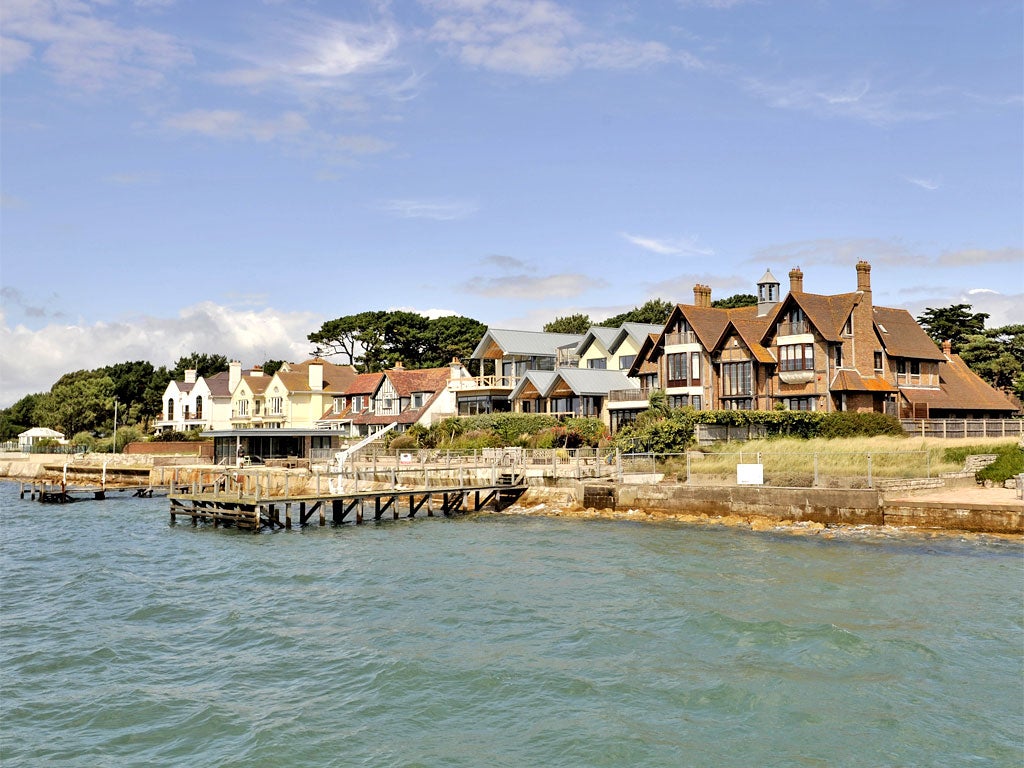A £10m home, a business empire – how bad with money can he be?
Cahal Milmo on the man with 'no business acumen' who has built an enviable lifestyle

For a man with a sprawling Tudorbethan mansion in one of the world's priciest property hot spots, and the sort of income that attracts a cumulative £8m tax bill, Harry Redknapp's forceful denials that he could be a "hard-headed businessman" with considerable "business acumen" sit uneasily with the reality of his multimillionaire lifestyle.
Prosecutors went out of their way at the football manager's tax evasion trial to paint a picture of an astute wheeler-dealer who has acquired considerable trappings of wealth, including his home in the exclusive Sandbanks area of Poole in Dorset, which has the distinction of being the world's fourth most expensive place to buy a home.
Mr Redknapp, who paid around £3m for his waterside property in 2002 and could now expect to sell it for more than £10m, was described by John Black QC, for the prosecution, as having a "keen sense of his pecuniary value". In other words, prosecutors believed Mr Redknapp was loaded and proud of it.
This is far from the image the former West Ham manager sought to present to jurors. In a typically combative display, Mr Redknapp, 64, the son of a painter-decorator from the East End of London, entered the dock to flatly reject Mr Black's characterisation of him. He said: "I'm a fantastic football manager. I'm not a hard-headed businessman. I've got no financial acumen whatsoever."
The Tottenham manager once told an interviewer how he persuaded three friends to provide £5,000 each while he was manager of Bournemouth FC to buy a player for £20,000 who was later sold for £500,000. The deal did not proceed after the club decided to put up the money for the player itself.
Off the pitch, Mr Redknapp, along with his wife, Sandra, is director of three companies all dedicated to the "development and selling of real estate". In 2007, Mr Redknapp, a racehorse owner, must have thought he was on to a winner. Through one his companies, Pierfront Developments Ltd, he pounced with business partners to buy Savoy Buildings, a block of dilapidated flats, and a second adjoining site on the seafront at Southsea, Portsmouth.
On paper, it looked a dead cert. The £8.5m development, the first phase of which proposed to build 92 flats and retail space earmarked for a Tesco store, was expected to make a £4m profit. Mr Redknapp was so confident about the deal he offered an unspecified share of his Sandbanks home as security.
Unfortunately, the Southsea scheme has not worked out. The credit crunch dampened the enthusiasm of Pierfront's bankers for the project and the company applied to Portsmouth City Council to vary its planning permission, complaining that a requirement for 28 of the flats to be sold as affordable housing made the project unviable.
To the annoyance of local campaigners, last August the council accepted a deal from Pierfront to pay £600,000 in return for dropping the affordable housing clause. Steven Wylie, a Liberal Democrat councillor, said: "It's a great disappointment to those families who we've now got to tell: 'You're not going to have that home because we've put profit before homes'."
Even then, the development failed to rise from the cleared site and further complications arose after Savoy Court, the second building bought by Pierfront, burned down, forcing its demolition. Last November, Portsmouth City Council served a notice on Mr Redknapp's company ordering it to clear up the site, which has now been done.
The Savoy Buildings site has been put up for sale by Pierfront with a price tag of £4m and offers are being encouraged for the adjoining Savoy Court.
When he was interviewed by City of London Police about tax fraud allegations against him, Mr Redknapp offered his Southsea property saga as evidence of his distinct lack of business nous.
He told officers: "The only downside is it's only worth £4m now and I've done £6m, you know. My house is up against it but that's where I'm at. That's how useless I am with things."
He offered further examples of what he said was his happy-go-lucky approach to matters financial, including a squandered £250,000 investment to help his friend and former assistant, Jim Smith, while he was manager of Oxford United. Mr Redknapp told police: "I can tell you 10 stories like that."
His trial heard that the contract he signed at Portsmouth in 2004 was worth £4.2m over three years. He emphasised that he had paid income tax totalling £8m – suggesting an income over the years of around £24m. The latest accounts available for Pierfront Developments show it made a profit of £1.7m in the year ending in November 2010.
But little, it would seem, is straightforward in the world of Mr Redknapp. The same accounts showed Pierfront's liabilities (mostly loans) exceeded its assets by £2.4m. A second company owned by the manager and his wife, Redsouth Ltd, which ultimately controls Pierfront, was in a similar position with its liabilities exceeding its assets by £2.9m. As Mr Redknapp told his police interrogators: "Unfortunately, I live my life like that."
Subscribe to Independent Premium to bookmark this article
Want to bookmark your favourite articles and stories to read or reference later? Start your Independent Premium subscription today.

Join our commenting forum
Join thought-provoking conversations, follow other Independent readers and see their replies